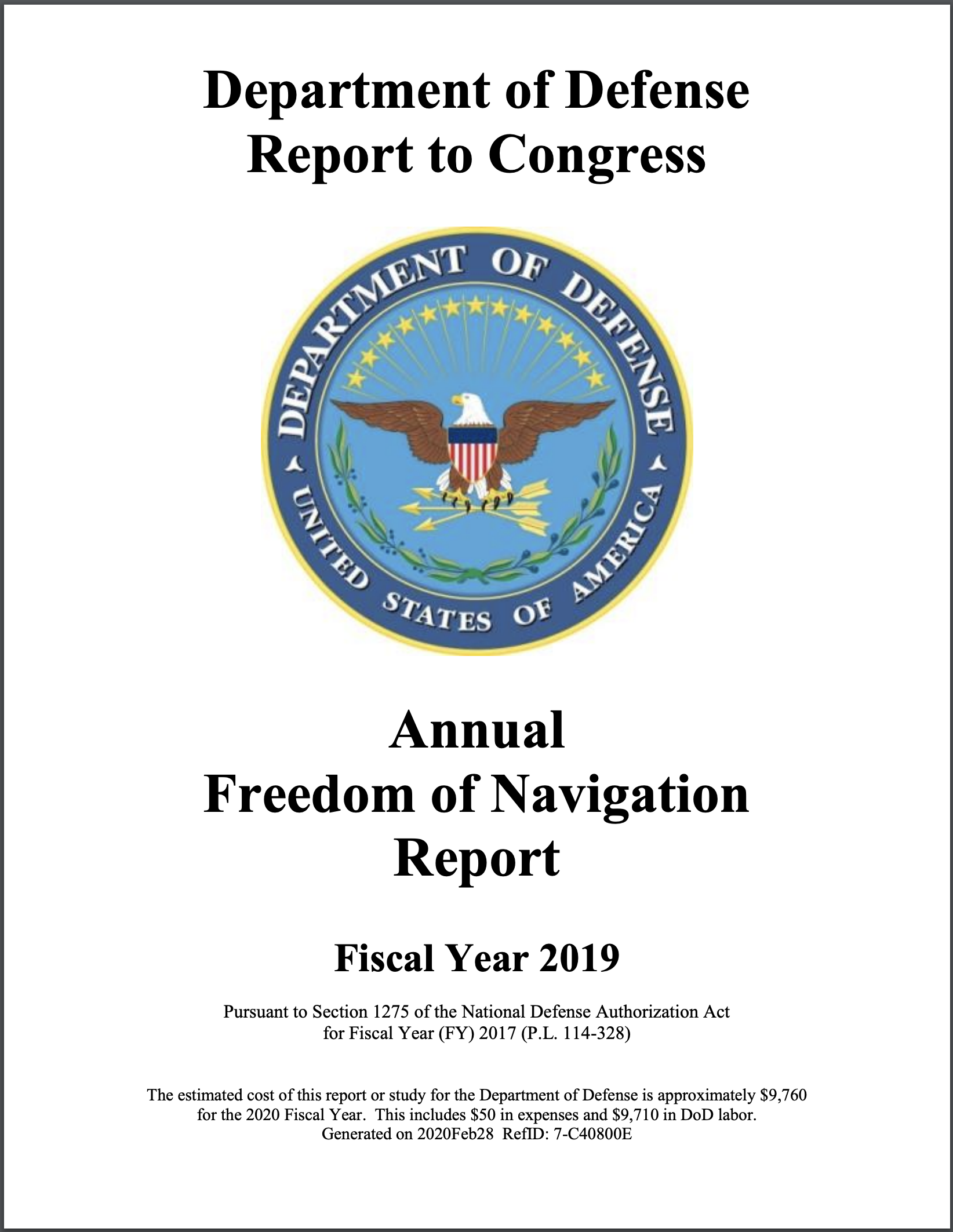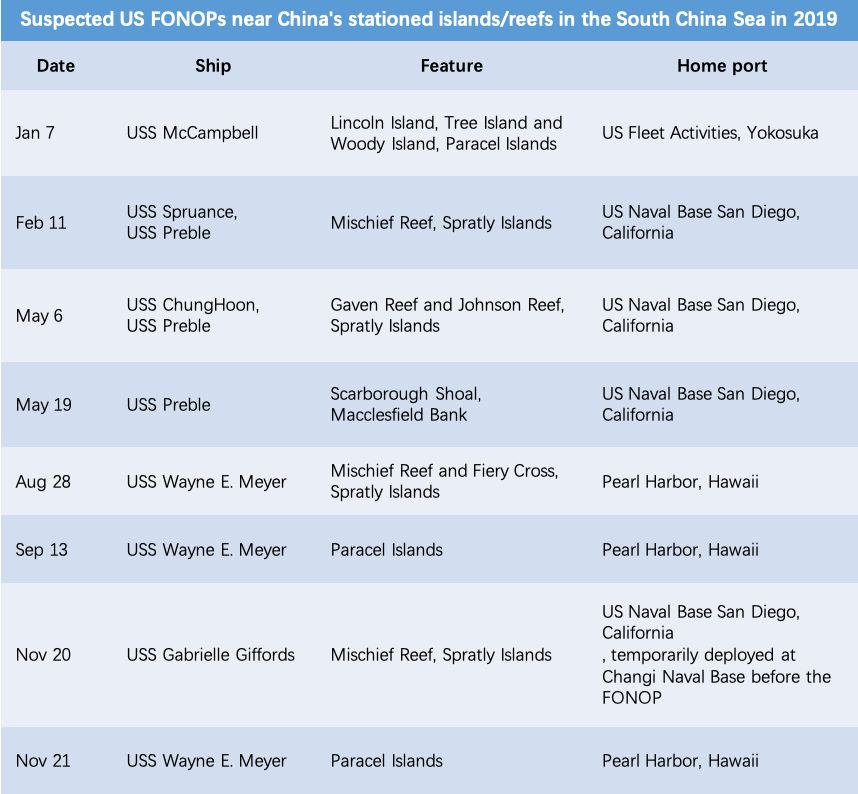Somebody did ask me, yet…
The US DoD fiscal year 2019 annual FONOP report titled “Department of Defense Report to Congress Annual Freedom of Navigation Report Fiscal Year 2019” was formally publicized on July 20, 2020. According to the cover page of this report, it was generated on February 28, 2020. For certain unknown reasons, it was postponed to reveal to the public for quite a few months this year.

Annual Freedom of Navigation Report, 2019
There are always containing several errors appeared in this United States government document that attracted less public attention. First, an error happened in the last edition was revised by addressing that “Pursuant to Section 1275 of the National Defense Authorization Act for the Fiscal Year (FY) 2017 (P. L. 114-328)”. It was mistakenly noted as “Pursuant to Section 1275 of the National Defense Authorization Act for Fiscal Year 2018” in the previous edition. As a matter of fact, the title of the Section 1275 of the National Defense Authorization Act for Fiscal Year 2018 is “United States military and diplomatic strategy for Yemen”, which is totally irrelevant to the Freedom of Navigation. The actual term as the legal basis of this annual report is the Section 1262 of the National Defense Authorization Act for Fiscal Year 2018 titled “Modifications to annual update of Department of Defense Freedom of Navigation Operations report.”
By so noted that only mentioned the legal basis addressed by the National Defense Authorization Act for the Fiscal Year 2017 in the FY 2019 edition, not only the further requirements noted by the Section 1262 of the National Defense Authorization Act for Fiscal Year 2018 titled “Modifications to annual update of Department of Defense Freedom of Navigation Operations report” but also contents requested by the Section 1288 of the National Defense Authorization Act for Fiscal Year 2019 titled “Modification of Freedom of Navigation Operations Reporting Requirements” are completely unnoted. In term of the completeness for introducing the legal bases of this annual report, it obviously missed certain essential elements for the people to understand the whole picture and legal requirements about how this report was generated.
It is also necessary to mention that the title of this report was demanded by the Section 1262 of the National Defense Authorization Act for Fiscal Year 2018 to be modified as “DEPARTMENT OF DEFENSE FREEDOM OF NAVIGATION OPERATIONS REPORT” was unchanged as “Annual Freedom of Navigation Report” for the title of the FY 2019 report.
Regarding the items of the “Excessive Maritime Claim” listed by the “Freedom of Navigation Operational Challenges, Fiscal Year 2019” table towards Beijing, several errors do appear in this United States governmental report. First, the term as “Order No. 75, Surveying and Mapping Law, Dec. 2002” addressed twice in the fiscal year 2019 report should be the Surveying and Mapping Law of the People's Republic of China originally adopted at the 29th Meeting of the Standing Committee of the Seventh National People's Congress on December 28, 1992, and subsequently amended at the 29th Meeting of the Standing Committee of the Ninth National People's Congress on August 29, 2002 as well as promulgated and was into effect as of December 1, 2002, by Order of the President of the People's Republic of China No. 75 issued by President Jiang Zemin.
Nonetheless, the same law was further revised by the Standing Committee of the National People's Congress in 2017 and subsequently promulgated by the Order of the President of the People's Republic of China No.67 by President Xi Jinping on April 27, 2017 as “The Surveying and Mapping Law of the People's Republic of China, which was revised and adopted at the 27th Session of the Standing Committee of the 12th National People's Congress of the People's Republic of China on April 27, 2017, is hereby issued for implementation as of July 1, 2017.” Articles and substantial contents of the Surveying and Mapping Law of the People's Republic of China have been dramatically revised since then. If the United States would like to express its disagreement towards certain maritime claims raised by Beijing, then Washington should address the valid legal decree, not a law already vanished more than two years ago. By challenging something already non-existed, the United States acted like Don Quixote to challenge a windmill as an imaginary dragon.
Another item towards Beijing listed as “Restrictions on foreign aircraft flying through an Air Defense Identification Zone (ADIZ) without the intent to enter national airspace. [Ministry of National Defense Announcement, Nov. 23, 2013]” should also be questioned. First, the nature of establishing an Air Defense Identification Zone is not a maritime claim. As Washington accused Beijing has raised an excessive maritime claim, perhaps the United States should prove the nature of defining an Air Defense Identification Zone can be or even should be categorized as a maritime claim before presenting such an accusation.
Second, the United States government should provide more solid evidence that indicating which words or phrases noted by the Ministry of National Defense Announcement, Nov. 23, 2013 did put restrictions on foreign aircraft flying through an Air Defense Identification Zone (ADIZ) without the intent to enter national airspace, otherwise, the excessive maritime claim noted in this column is nothing else but a plausible speculation.

Frankly speaking, the FONOP conducted by the United States is a well-packed gunboat diplomacy covered by various legal arguments. The nature for this FONOP policy is never the “just cause” but the “just because”. If Washington wants to justify all these challenging maneuvers and to make those arguments more convincible in the International community, more delicate efforts are inevitably needed.
Aug 20, Mr. Jonathan G. Odom made a response to criticism of the DoD’s 2019 Freedom of Navigation Report, published on AMTI. Here is Dr. Chang Ching's reply.
Dear Mr. Odom,
Please accept my apology for not addressing the rank of an active navy officer in order to express my professional respect since the CSIS AMTI failed to note your military rank in your commentary on my perspectives.
1. No one can discredit anything that the report never mentioned. Without solid evidence to prove that I do have the intention of discrediting the report is nothing else but plausible speculation.
2. If the reference of the operational challenges to China’s Surveying and Mapping Law in the next year report will adopt the 2017 edition, I will accept the appreciation from the United States government about my inspiration, otherwise, please keep noting the 2002 edition as the reference.
3. The arguments raised by President Reagan or Secretary Kerry about clarifying the accusations of Beijing establishing the East China Sea ADIZ did not appear in the FY 2019 report but only the Beijing’s Defense Ministry Announcement. Let us see whether the next year report will provide these two interpretations or not. I will provide my comment after your argument and interpretation may actually appear in the next year report.
Last but not least, what is the substantial content of the maritime claim as establishing the Washington D.C. ADIZ? As I said, “establishing an ADIZ is not a maritime claim, there are many other examples may prove my viewpoint. I am a graduate from the USNWC. I have enthusiasm to share my perspectives about the legal issues on this topic with my friends in Newport when I got back for reunion in my alma mater two years ago. Sad to know that no one would like to listen. If the United States still wants to stay enjoying your own side of viewpoints and need no advice. I will express my respect to your choice. You should also feel happy that I have an even more harsh standard towards Beijing but many of them will listen to my advice and swallowing the bitter but nutritious fruit.
Fair wind and calm sea,
CHANG, Ching, Ph.D.
Society for Strategic Studies, Taipei

